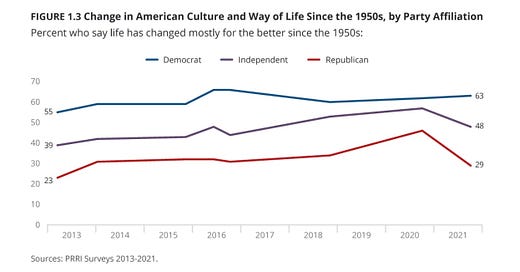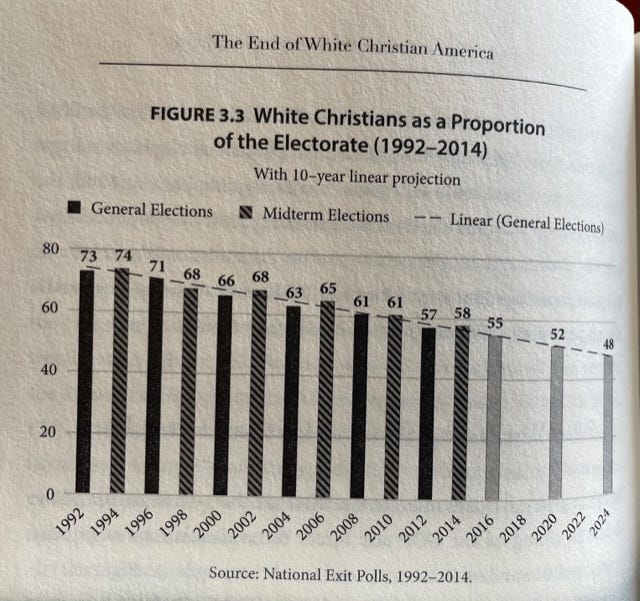Political Polarization (5): The End of the World as We Know It
Christian Nationalism and Good vs. Evil
It was a striking moment for me. I was watching the February 2016 New Hampshire Republican Presidential Debate (proof that I am, indeed, a political junkie!). Senator Marco Rubio had prepared a line he used multiple times during the event. He said, “Let’s dispel with this fiction that Barack Obama doesn’t know what he’s doing. He knows exactly what he’s doing. He’s trying to change this country.”
In part, Rubio was trying to create space between his position and Trump’s (spoiler: didn’t work). Trump had been arguing that Obama was incompetent. Rubio was introducing something new: Obama was trying to change the county. Just imagine! A two-term Democratic president would be pursuing his preferred policy agenda!
To this day, two things stand out to me about Rubio’s claim. First, Obama was in his last year of his presidency and had Republican majorities in both the House and the Senate. Not sure what, exactly, he was going to do. The second thing that shocks me even today is that nobody in the press followed up to ask what the heck Rubio was referring to.
Claims like Rubio’s are now commonplace in political rhetoric. Democrats are Marxist, Socialist, One-world-government advocates who want to destroy everything “we” hold dear. Every election becomes a “Flight 93 election” because if THEY get in control, all is lost.1
Listen to Republican politicos talk about the likely Trump 2024 campaign. They will say that they aren’t sure he should run but if he won the nomination they would support him (in spite of everything we have learned in the last two years) because having the Democrats win would be infinitely worse.
In their annual American Values Survey, PRRI asks about views of social change since the 1950s. Their most recent survey shows that less than a third of Republicans2 see those changes as good while nearly two-thirds of Democrats think so.
One of the largest blocks among Republican voters are White Christians (evangelicals, non-evangelicals, and non-Hispanic Catholics). I did some analysis five years ago that demonstrated that Republican white evangelicals generally reflected overall Republican policy positions (with the exception of some culture war issues).
This sense among White Christians that society is changing for the worse feeds the animosity toward Democrats and makes issues of compromise remarkably difficult.3 In fact, I’d argue that the dominance of the Manichean (good vs evil) view among large segments of White Christians has made space for this thinking among the Republican party in general.4
In 2015, Robert Jones - then CEO of PRRI5 - wrote the very provocative The End of White Christian America. In this book, he explored the demographic shifts occurring with American religion; the rise of the “nones”, the increase of immigrants, and other changes. In one revealing section, he describes the impact the decline of the White Christian block would have on the electorate (picture is from my book).
I couldn’t easily find updates on this data and I suspect that the projections for 2016, 2020, and 2024 might be a little low. But the overall trendline seems trustworthy to me. This means that not only is cultural change looked upon suspiciously from the right, but the power of White Christians to sway the election is shrinking.6
The combination of cultural change and relatively diminished political power creates some expected backlash. That increased activism among an angry minority is evident in the research by Andrew Whitehead and Samuel Perry in their Taking America Back for God. In exploring Christian Nationalism, they uncover that a significant percentage of their religious sample holds views expecting America to give a conspicuous role to Christianity. Over 30% of their sample are what they call Accommodators. They maybe open to pluralism, but Christianity is central. Nearly 20% are named Ambassadors who argue that the US is a distinctly Christian Nation and that this view should guide our political agendas.
This stands in contrast to the increasingly nonreligious makeup of the Democratic electorate (Black Protestants notwithstanding). This group looks positively at cultural change, values diversity (which is why pronouns are important), and despises intolerance (although the extremists can certainly be intolerant themselves).
The conflicts that result are seen not simply as political discourse, but as matters of future civilization.7 What kind of world should we live in?
There is an added feature to this conflict. For many, the battle isn’t just about the current world but for the larger cosmos as well. Brad Christerson and Richard Flory investigated the New Apostolic Movement. The role of prophets and cosmic battles (a la Frank Peretti) is key to understanding these groups. Many of these prophets loudly predicted that Trump would be reelected (some apologized but that got them in trouble!).
The political battles, then, are not just about partisan policy or differences of approach. They are proxy battles for God and Country and Good against Evil.
One more thing. Sociologist Christian Smith argued late in the last century that evangelicals defined themselves by conflict with “the world”. While I personally believe that evangelicals find it harder and harder to sustain a position he calls “embattled and thriving”, it is still true that they will be combative in their political stances. While such a stance creates backlash on the left and confusion among independents, the backlash is seen as evidence that the Christian right is doing its job. While a significant percentage of White Christians claim that they face discrimination (over 70% of white evangelicals and 40% of white mainline and white Catholic) because of their sincerely held beliefs8, that discrimination is often a point of pride.
I’m not optimistic about our ability to overcome these differences is how we see the world. In part, it may simply be a function of continuing religious change especially among the younger segment of the population. In the meantime, we’re facing a bumpy ride for some time to come.9
This rhetoric goes the other way as well. Democrats claim that the right wants us all to live in Margaret Atwood’s Gilead (including Atwood). But given the structural advantages Republicans hold (electoral college, gerrymandering, filibuster), Republicans have acted in advance of Democrat’s fears more than Democrats have brought Republican fears to life (which is why they rely on drag queen story hour and pronouns as their proxy war).
I’m not sure how to explain the increase in Republican views of social change in 2019 and 2020. Likely a Trump can fix it effect.
Just today I saw a clip of a Republican congresswoman personally blame Speaker Pelosi for 60 million “murders” since Roe was decided in 1973.
Whose candidates and elected officials are increasingly conservative Christians.
He now has the title “President and Founder”
It is true that somewhere around 80% of white evangelicals vote for the Republican candidate, but that doesn’t account for their potentially shrinking share of the electorate. Having 80% of a smaller total has less of an impact.
I read that this is a common trope for Tucker Carlson but I refuse to watch in order to confirm for myself!
The recent Supreme Court docket notwithstanding
Barring the alien invasion that will come in response to us messing around with the Webb telescope!






John, your observations are excellent. I’ll just focus on your final paragraph: “I’m not optimistic about our ability to overcome these differences in how we see the world. In part, it may simply be a function of continuing religious change especially among the younger segment of the population. In the meantime, we’re facing a bumpy ride for some time to come.” I agree—we have a long and bumpy ride ahead and I even wonder if the democratic republic we have will make it. For me, the younger segment of the population is where my hope is. Many of them (at least most young folks I teach) really want to make a difference and they see the pain of the poor, they worry about the ecosystem, etc. They are seem more tolerant of and willing to dialog with people with different lifestyles, and they want a better world for their kids. The boomers (well, me anyway) didn’t do very well and fell into the traps you’ve referred to in previous posts.
Thanks John for your insight and hard work. God bless.